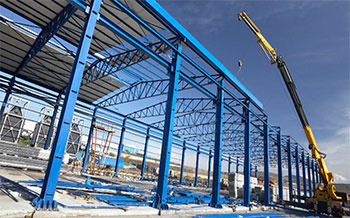
CONSIDERATIONS FOR INDUSTRIAL ROOF CONSTRUCTION
January 09,2023
Considerations for Industrial Roof Construction
Industrial roof construction requires careful planning and consideration to ensure the safety, durability, and functionality of the building. Whether it is a manufacturing facility, warehouse, or distribution center, the roof plays a crucial role in protecting the structure and its contents from external elements. This essay explores the key considerations that need to be taken into account when constructing roofs for industrial buildings.
Structural Integrity:
One of the primary considerations for industrial roof construction is the structural integrity of the building. The roof should be designed to withstand the weight of equipment, machinery, and potential heavy loads, such as snow accumulation. Engineers must assess the load-bearing capacity of the roof and ensure it meets or exceeds the required standards. Factors such as the type of materials used, the design of the trusses or beams, and the overall structural system should be carefully evaluated to ensure the roof can support the anticipated loads.
Weather and Environmental Factors:
Industrial buildings are exposed to various weather conditions and environmental factors. The roof should be designed to withstand extreme temperatures, high winds, heavy rain, and even seismic activities if applicable to the region. Choosing the right roofing materials that are resistant to corrosion, UV radiation, and thermal expansion is crucial. Additionally, proper insulation and ventilation should be considered to regulate temperature, prevent condensation, and improve energy efficiency within the building.
Fire Safety:
Fire safety is a critical consideration in industrial roof construction. Depending on the nature of the industrial activities, there may be a higher risk of fire hazards. Implementing fire-resistant roofing materials and incorporating fire-rated assemblies can help minimize the spread of fire and protect the structure. Adequate fire suppression systems, such as sprinklers, should also be integrated into the roof design to ensure prompt response in case of a fire emergency.
Accessibility and Maintenance:
Industrial roofs should be designed with accessibility and maintenance in mind. Proper access points, such as walkways, catwalks, or stairs, should be included to facilitate inspections, repairs, and regular maintenance tasks. The selection of roofing materials should consider their durability and ease of maintenance. Roofing systems that require minimal maintenance, such as metal roofs or single-ply membranes, can be advantageous in industrial settings, reducing downtime and costs associated with repairs.
Energy Efficiency:
In today's environmentally conscious world, energy efficiency is a significant consideration. Industrial roofs can contribute to energy savings through proper insulation, reflective coatings, and the integration of renewable energy systems like solar panels. Utilizing natural light sources, such as skylights or translucent panels, can reduce the need for artificial lighting during the day. By implementing these energy-efficient strategies, industrial buildings can lower operational costs and reduce their carbon footprint.
Constructing an industrial roof involves several crucial considerations to ensure the long-term viability and safety of the building. From structural integrity and weather resistance to fire safety, accessibility, and energy efficiency, each aspect must be carefully evaluated and addressed during the design and construction phases. By giving due consideration to these factors, industrial roofs can provide a robust and reliable solution, protecting the building, its occupants, and the assets inside, while also promoting sustainability and reducing operational costs.
WAREHOUSE STEEL STRUCTURAL CONTRACTORS
Warehouse Shed Cost - Estimation Per Sq ft

Why To Choose Warehouse Builders?
Learn More
Essential Blogs for the Construction Industry
Learn More
Pre-Engineered Building Future of Construction Industry
Learn MoreOur Industrial Construction Works
When you choose us, you'll feel the benefit of 20 years' experience of industrial construction services. With our capacity to meet the mass requests, we have had the option to take special care of the requirements of our significant clients.
Warehouse Construction
The most common material used for warehouses is steel, creating a pipe system that supports the outside cladding & roof.

Industrial Construction
Industrial construction deals with factories, power plants, warehouses, and other highly specialized facilities.

PEB
Manufacturers
Pre-Engineered Building is the fundamental based design which directly manufactured by the PEB Manufacturers association.

PEB
Contractors
PEB is the ideal choice for any kind of construction needs whether it is for the individual reason/for the business reason.

Pre-Engineering Building
Pre-Engineering Building are broadly utilized in the residential just as industrial sector for its unparalleled attributes.

PEB Steel
Building Construction
Steel is heat proof, meaning it will not totally stop a fire. Steel is one of the most durable materials for construction.

